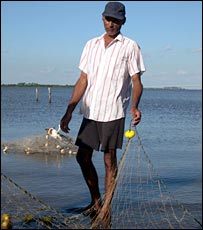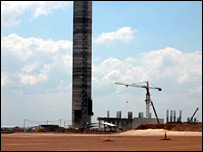|
By Daniel Schweimler
BBC News, Argentina
|

It seems like a long time ago that traffic last flowed freely between Argentina and Uruguay.

Lorries cannot get through and tourists have to take a detour
|
The long bridge that spans the river Uruguay - the border between the two countries - is normally bustling with tourists and heavy cargo.
But now it is practically deserted since protesters on the Argentine side of the river have been blocking access to it.
The dispute started last year when residents of the Argentine town of Gualeguaychu began protesting against plans by two European companies to build pulp mills on the Uruguayan side of the river.
The Argentines, supported by environmentalists from around the world, including Uruguay, say the mills will pollute the river, scaring off tourists.
Those on the Uruguayan side say they believe the assurances from those building the factories that there is no risk of contamination.
They also welcome the much needed jobs and investment that the two companies - Ence from Spain and the Finnish firm Botnia - are promising.
Argentina is threatening to take Uruguay to the International Court of Justice in The Hague, saying construction of the mills contravenes treaties designed to protect the river.
The Uruguayan President, Tabare Vazquez, has accused Argentina of behaving like a man who hits his wife just in case she does something wrong.
Blockade
Residents of Gualeguaychu and Fray Bentos, on the Uruguayan side of the river, are not on speaking terms.
Meanwhile, as work on the two pulp mills continues, the residents of Gualeguaychu continue to camp on the road leading to the bridge.
Lorries cannot get through while tourists take a detour, 100km (60 miles) to the north and the next bridge across the river between the towns of Colon and Paysandu.
A wagon is in place across the road, next to a tractor. Flags with the slogan "No to the paper mill" adorn the trees. Paintings on the road illustrate poisoned fish.
Protesters gather around small fires drinking mate tea through metal straws to keep warm in the early morning chill. Almost every evening they hold meetings to discuss their next move.
A delegation from the protest has met the Argentine President, Nestor Kirchner, and come back to inform their colleagues that he has expressed his full support.

Environmentalists fear the river will be polluted
|
Ricardo Carrere, a Uruguayan from the World Rainforest Movement, said the construction was going ahead before many issues had been resolved.
"The pulp mills are planned to be built on a river that we share with Argentina so they do have a right to protest, and in many aspects Uruguay violated treaties over the River Uruguay," he said.
"They didn't consult with Argentina in the first place about the pulp mills so there's a diplomatic situation that's not yet solved."
At risk?
One of the protest leaders, Alfredo di Angeli, says the construction work should stop until a full and independent study of the possible effects the pulp mills could have on the river has been carried out.

Protesters gather every evening to discuss the next move
|
"It would not put these companies at risk to close for 30 to 60 days," he says. "Meanwhile, thousands and thousands of Argentines living on their side of the river are at risk."
Environmentalists say the technology exists to ensure the safety of the river but the two European companies are employing cheaper, less effective measures than if they were building the plants in their own countries.
This is denied by the Finnish company Botnia.
Its spokesman Bruno Vuan says: "We are sure that we are applying the best technology available today in Europe, particularly in Scandinavia where the best environmental industries are. So we think that this river will not be polluted."
Support
The work on the site, which will cost more than $1bn, is already well advanced, with a 116-metre (380-ft) tower dominating the skyline.
More than 1,000 construction workers from all over Uruguay are at work, with hundreds more to follow.
Botnia says the pulp mill will directly create hundreds of jobs with service industries growing up around the plant creating many thousands more.
The mills will turn timber produced at eucalyptus plantations in Uruguay into pulp for export to the paper industry in North America, China and Europe.
It is a multi-billion dollar business, and a number of other foreign companies are hoping to invest in Uruguay.
The people of the nearby town of Fray Bentos cannot wait. Unemployment is high and opportunities few.

Some 1,000 Uruguayan builders are working on one of the plants
|
Almost everyone supports the construction now under way on their doorstep and they are angry at what they as a misguided protest on the Argentine side of the river.
Fray Bentos journalist Fernando Gerfauo says the blockade has hit the town hard: "People here that live off tourism from Argentina can't work this summer because no-one is coming."
Politicians on both sides say they want to talk. But the Uruguayans say there is no point meeting until the blockade is lifted. And the protesters say they will not talk until construction work stops on the two pulp mills.
